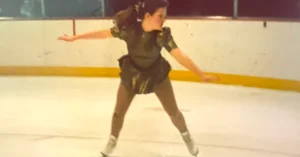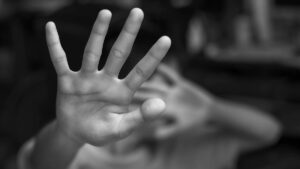The term disability or identifying as disabled has long been seen by mainstream society as negative, wrong, bad, a character flaw, dirty, tragic, pitiful, or an inability. Those with disabilities are seen as having a lesser value and remain outside the human experience. This way of thinking and the discomfort with the word does not come from those with disabilities, it comes from those external to it. As a disabled person, it is not my responsibility to make you comfortable with something I’m dealing with! The reality is my perspective on my life is going to be different from anyone external to it.
Since the beginning of time, science has set out to cure those with disabilities or even eliminate them by viewing them as a problem. Eugenics is the practice or advocacy for improving the human species by selectively mating people with specific “desirable” hereditary traits. It aims to reduce human suffering by “breeding out” disease, disabilities, and so-called undesirable characteristics from the human population. This has led to many horrible things such as institutionalization, forced sterilization, abortion/adoption being suggested, even pushed, by medical professionals on parents expecting a child who has a diagnosis that is categorized as disabled, segregated education and workspaces, separate transportation systems, even the acceptance of abuse and mistreatment of disabled people by society. Doing these things to a person with a disability is seen as supporting them and as being beneficial. Some of these things are helpful because without learning how to navigate the world or having the proper equipment to do so, the lives of those who are deaf and blind are, at times, placed in danger. Without a lift on a bus, a person in a wheelchair can’t get on. But, do the benefits outweigh the disadvantages or drawbacks?
Society says a cat is a pet that requires food, water, a place to eliminate, and sleep. Those are all true because we know that to have a happy pet and be a successful pet owner, we must meet these requirements. Now, let’s say society says the pet’s bed, place to eliminate, food, and water MUST all be placed on the floor of a home. As someone who is disabled, resulting in being a full-time wheelchair user, society has now said that I cannot own a cat. Not only that, but it also says that I’m incapable of being a cat owner. We all know that cats can get to high places, they have no issues jumping from the floor to a table, or into their human’s bed. As a disabled person, who uses a wheelchair full-time to feed and give my cat water, independently, the bowls, food, and water all have to be accessible, so I am able to reach them. When those things are in an accessible place I can, with very little, if any, assistance, be a successful cat owner. Society insists on enforcing unrealistic standards using them as proof of all the negative narratives that exist about disability that say I am unable while continuing to refuse to accept a different way of doing something.
There are many different terms used to describe someone with a disability. Some of the terms used to refer to a disabled person have changed throughout history, such as cripple, gimp, and handicapped, which are all considered offensive. Those terms have been replaced by terms like differently-abled, handi-capable, special needs, or as having special or different abilities. These are considered more accepting and as seeing those with disabilities as no different than anyone else. There isn’t anything wrong with seeing someone with a disability as not any different than anyone else. Or is there? On the surface, especially to those who do not struggle with the many issues those with disabilities face, as a result of living in a world that isn’t designed for them, these seem harmless, but, for the person with a disability that isn’t the case. Refusing to see my disability is refusing to see a significant part of me that needs to be considered for my safety and well-being.
Differently-abled implies that I, as a disabled person, have different abilities than those possessed by able-bodied people. If I am in the grocery store as a wheelchair user and the bread is on a shelf I can reach and you are there and the bread is on a shelf you can reach, we both are able to successfully get the bread. If the bread is out of your reach or mine we are both unable to get the bread. The reality is I don’t have a different ability. I do the same things you do in a different modified or accommodated way. Handi-capable is a term that was adapted from the term handicapped which refers to those with disabilities as beggars because in history a king passed legislation that allowed those with disabilities to go out into the street begging for money. Handi-capped was developed from the reference of “hand-in-cap” as those who beg for money typically did so with a cap in their hand. So, if handi-capped is in reference to begging then handi-capable means I’m capable of begging? Why would I, as a disabled person, be okay with being referred to in this way? Special needs, when used in reference to someone with a disability, is offensive. It doesn’t, in any way, apply or accurately describe anything we deal with. Special needs are considered to be things that those with disabilities need that those without disabilities don’t. A diabetic requires a special diet and needs to avoid sweets. Someone allergic to nuts can not consume or be around anything with nuts. Someone who is allergic to bees or any number of other things requires an EpiPen in case they are stung or come in contact with what they are allergic to. Any number of those things could be considered a special need but indeed are not considered a disability. Special needs can also refer to a classroom within the school setting where all the disabled students are with a special teacher and assistance separate from all the able-bodied students. I need to go to the restroom, I need to eat, I need to drink, I need to get dressed for the day and for the night. Everyone in the world requires food, drink, the restroom, and clothing, but because I require assistance with those, they are all of a sudden a “special need.” It is true when you live with a disability life is different. There are things that are a struggle but many of those things that are and that are different are things a disabled individual can handle independently or with minimal help. When referring to a person with a disability as having special or different abilities it is demeaning rather than being inclusive, or an attempt at showing you see us as no different it points out the exact opposite. The truth and reality for me, as a disabled person, is I was born this way. If it wasn’t for the external world always pointing out and adjusting the way they refer to me I really wouldn’t wonder what was wrong or why everyone is acting weird around me. Gee, thanks able-bodied external people for assuming I am not okay with being disabled and coming up with a way to make yourself more comfortable with it.
Disability is not bad, wrong, or dirty, but it is a topic people need to become more comfortable with. Why are you, as an external person to me, ashamed of what my reality is? Better question: Why on earth are you more ashamed of me than I am? When we try and sugar coat disability, as anything other than what it is, it hurts worse than the reality of it and greatly impacts mental health. It allows the world to continue to ignore the things it needs to change so those with disabilities can find a true place of belonging. It minimizes and dismisses the lived experiences of those with disabilities that are not easy to deal with, and are even made harder when you’re living in a world that is not designed for you. Being fought every step of the way for the space you take up that others are freely given is something we, as disabled people, frequently experience, and it hurts. Disability doesn’t need to be reframed. We need to stop forcing impossible conformity onto those who have disabilities. What the world needs to begin doing is learning what a disabled person deals with from a disabled person and not giving in to the third party perspective that is seen as the only one of value. We need to foster acceptance of those with disabilities by being inclusive and considering what they need so they can be active, free, and independent members of the world like all other people already are. You as an able-bodied person do not have the right to come up with terms to describe my lived experience, especially when the attempts you are making are minimizing and dismissive. Disability isn’t an issue or a problem but the way others handle and respond to it is.





One Response
Thank you so much for taking the time to put into words, honest and straightforward words, how the TAB’s (temporarily-able-bodied) languaging of disability has served to disempower and separate us from the communities around us. From earliest memory as a disabled female in the ’60s and ’70s, I can recall the separateness I felt. At the time, the only way that my child’s mind could comprehend it and child’s words could communicate it was by witnessing the civil rights movement and thinking that my disability was perceived as negative by others because, like people of color, I looked different than the majority. Imagine my shock at my very white parents’ outrage when I proclaimed: “Being in a wheelchair is just like being black!” The kinship I felt was vehemently denied and I was warned never to say it nor think it again. A few years later, the women’s movement came along, and again I thought I finally understood. “Being in a wheelchair is like being a woman, because men think we are weaker.” Only my femaleness gave me power and I knew too many women who agreed with the men. So I was in limbo, with nowhere to belong and no name to call mine.
Years of words, names and identities came and went but I couldn’t relate to any of them. Then I found my home, my people and we used our own words, took back some that were meant to disparage and molded them into powerful symbols of ownership and pride. We found disability, not only the word, but the culture! This transformative discovery has allowed me personally to, at last, bloom into the whole person I was born to be. That could not have occurred without the strength of a disabled community that recognizes and celebrates itself.
Now, when a person in authority tells me what words are acceptable for me, as happened this week during an MFT practicum course, I have the words and the power to set the record straight and make myself and my culture seen and heard.